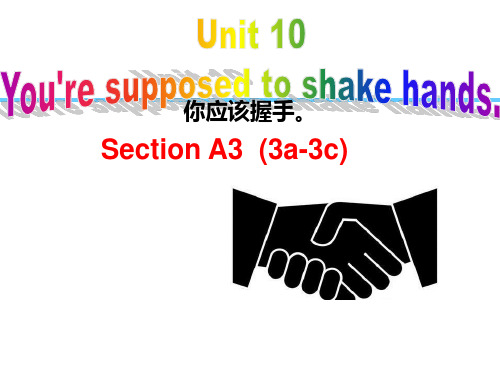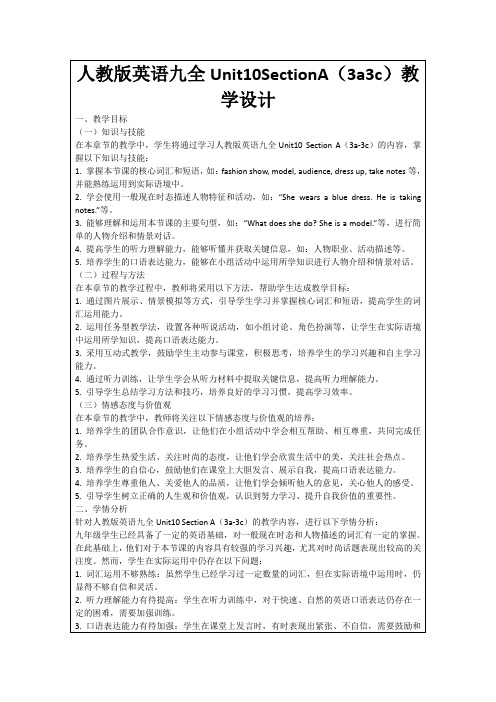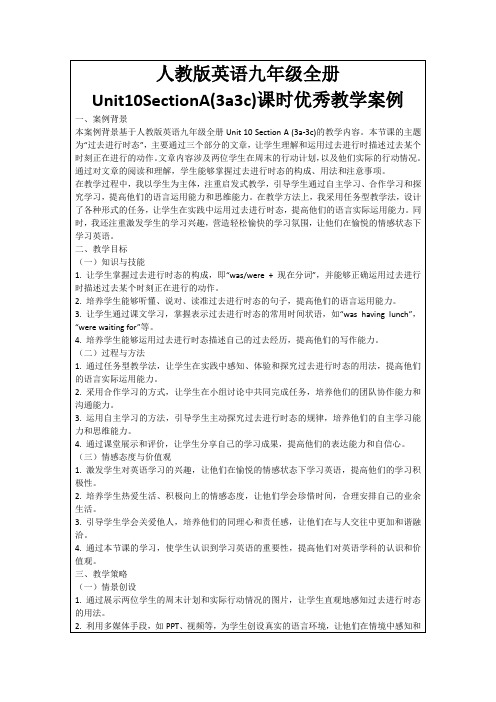九年级英语Unit10SectionA 3a-3c
+Unit+10+Section+A+3a-3c+教学设计 人教版九年级英语全册

Unit 10 You’re supposed to shake hands.Section A (3a-3c)The Analysis of the teaching material:This reading part includes two compositions written by two students from Columbia and Switzerland respectively,expressing their opinions about customs in their own countries such as the time concept.The customs talked about in the passage are completely different and then compared with each other, which tells the fact that cultural shock is very normal because of politics, economy and geographical features.So we shouldn’t attach more importance to one than the other.And the essence and good points should be kept and spread.Learning Aims:To master key words,phrases and sentences:value,capital,get mad,drop by,make an effort to,after all,etc.In Switzerland,it’s very important to be on time.I think it’s impolite to keep others waiting.etc.To read carefully about different customs of Colombia and Switzerland. To get a better understanding of “be supposed to/be expected to”in the specific contexts.To realize the differences of customs of different countries and respect other cultures.Learning Key Points:To master key expressions.To understand better the phrases---be supposed to and be expected to.To successfully get the detailed information while reading.Learning Difficult Points:To successfully find out the details about customs of the two countries. Teaching Procedures:Ⅰ. Free TalkT: Suppose you have a date with your friend, your friend is late and keeps you waiting without informing you first,do you think it’s impolite?S: …T: Right,it’s not polite to do so and you will even get mad if he or she isn’t on time. That’s because we believe time is valuable and being on time is important.S: …T: However, not everyone in the earth thinks so.People from France and those from the US disagree with each other. Here is a short video.Let’s watch.---T:After watching the video,we can see that different countries have different time concepts.And the passage we will learn today includes two short essays written by two students from different countries.They talk about their time concept in their countries.Let’s get to read more.Ⅰ. Pre- reading1. Lead students to pay attention to the two writers of the two essays,one from Columbia,the other from Switzerland.And then show several pictures of the two countries and talk about them.2. Encourage students to guess in which country it’s ok to be 15 minutes late for dinner.Ⅰ. While Reading1. Tell Ss to read the article quickly and check their guessing about the question:In which country is it OK to be 15 minutes late for dinner?Key: In Colombia.Students read through again and find out other customs the two students mention in their essays.T:Through the 1st reading, just as Teresa and Marc write, we know thatthe Colombians and the Swiss have their own ideas and customs about time. Then besides the custom related to time, do they mention other customs?Students read carefully again and find out the common customs the two students write about and compare them, and fill in the form.Colombia SwitzerlandIdeas and customsabout…Being on timeVisiting a friend’shouseMaking plans withfriendsEncourage students to think:What are the features of their customs?T:After reading, after the comparison in 3b,we can see that the customs from the two countries are totally different.Then how do you think of their customs?What are their features?People in Colombia ---S:---Ⅰ. Post-readingThink and write:1, If you get a chance to study in Colombia or Switzerland,which one will you choose to go and why?Write a short passage to express your ideas. 2, Think about “being on time”,“visiting a friend’s house”,“making plans with friends”in the context of Chinese culture,and write a short passage.。
Unit 10 SectionA 3a-3c课件 人教版英语九年级全册

Guide 3:Underline and understand.
Wtmteimlihlneead.rWfeirfeiIpe'dmneboodepnfyrrl'oetolmulai'kxr,rreeewudatgesoa'ohlribritenautolrgpvsueohrattuleolaaunt对tttredeyho.sesu.匆rb.oie感nr.ml忙/dahs到,etxos的hteoui放dmhsweia松egebsfho.d/oIl随rofyunyt意'otu sdpinenndert,iitm'seOwKithifsybo.u和a某rr高i人v度e共a重度b视i时t l某a光t人e.W/某e 物like to enjoy our time slowly.We value the time we spend with our family and friends in our everyday livietsi.sW+e形of容te词n j/u名st词dr+ofoprbsyb.o+urtofrdioensdths' hmoamkeespilfawnsedthor做aomvp某eebet事yitm+o对地eu.rW于点fre某名ide人no词dn是s't.顺W怎us便h样uea拜n的llwy访/是eh.a.s.什evee么to effaoacrcehg.Wi=orptleshlameotonrfsa,teiketkteon'ieidssandsjrpspguooelo..sap..asl..tniwactitwhhssneeats计ofocoblotnak.hrd划ncseaob.barr做o现sn.ooyt顺/u某hnsc在not便td事uo分hles拜d词hsai访尽d做kee某可伴ohf人能a随tnh.d状.e.s 语and the town center,seeing as many of our friends as we can.
人教版九年级英语全一册Unit10(SectionA3a3c+GrammarFocus)教学设计

在本章节的学习过程中,学生将采用以下方法:
1.通过小组合作、讨论等形式,运用所学的词汇和句型进行口语交流,提高口语表达能力。
2.通过阅读和分析文章,培养阅读理解能力,掌握阅读技巧。
3.通过语法练习,巩固一般过去时和现在完成时的用法,提高写作能力。
4.通过课堂互动,培养学生主动思考、积极参与的学习态度。
(三)情感态度与价值观
1.培养对英语学习的兴趣,增强自信心,形成持续学习的动力。
2.增进对他人经历和成就的认识,学会尊重和理解他人。
3.培养团队合作意识,学社会问题,培养乐于助人的品质。
在教学过程中,教师应关注学生的个体差异,鼓励学生积极参与,激发学生的学习兴趣,使他们在轻松愉快的氛围中学习英语,提高英语素养。同时,注重培养学生的情感态度和价值观,使他们成为具有责任感、关爱他人和积极向上的社会主义接班人。
2.学生分享学习心得,讨论在小组讨论和课堂练习中的收获和困惑。
3.教师针对学生的反馈,进行答疑解惑,巩固知识点。
4.教师强调本节课的情感态度与价值观目标,引导学生正确对待名人效应,关注社会问题,培养积极向上的价值观。
五、作业布置
为了巩固本节课的学习内容,培养学生的自主学习能力和语言运用能力,特布置以下作业:
(二)讲授新知
1.教师呈现Section A 3a-3c的短文,引导学生通过略读、寻读等方式,获取文章大意和关键信息。
2.教师讲解并板书本节课的核心词汇和短语,让学生跟读、模仿,确保正确掌握发音和用法。
3.通过对文章的深入分析,帮助学生理解一般过去时和现在完成时的用法,特别是它们在描述过去事件对现在影响时的区别。
例如,通过分组讨论名人的成就和贡献,引导学生运用一般过去时和现在完成时描述名人的经历和影响。
人教版英语九全Unit10SectionA(3a3c)教学设计

关注学生个体差异,设计不同难度的教学活动,使每个学生都能在原有基础上得到提高。针对基础薄弱的学生,进行个别辅导,提高他们的学习自信心。
4.搭建语言支架:
在教学过程中,为学生提供语言支架,如词汇卡片、关键句型提示等,帮助他们更好地理解和运用所学知识。随着学生能力的提升,逐步撤除支架,培养学生的自主学习能力。
5.听力训练:
设计不同难度的听力任务,逐步提高学生的听力理解能力。引导学生总结听力技巧,如预测、关键词定位等,提高听力效果。
6.口语表达训练:
鼓励学生大胆开口,积极参与课堂活动。采用同伴互评、教师评价等方式,为学生提供反馈,帮助他们提高口语表达能力。
7.课堂互动:
加强课堂互动,采用提问、讨论等方式,引导学生主动参与课堂,积极思考。关注学生的情感需求,营造轻松、愉快的学习氛围。
(2)完成课本练习册中Unit10 Section A(3a-3c)的相关练习题,加强对词汇、句型和语法的掌握。
2.口语作业:
(1)与同学合作,进行角色扮演,模拟一场时尚秀,要求运用所学词汇和句型进行表演。
(2)录制一段关于自己喜爱职业的介绍视频,使用一般现在时态进行描述,提高口语表达能力。
3.拓展作业:
(二)讲授新知
1.教学活动设计:
-通过多媒体展示Unit10 Section A(3a-3c)的听力材料,让学生听并跟读,学习新词汇和句型。
-讲解一般现在-学生听听力材料,跟读并学习新词汇和句型。
-教师针对一般现在时态进行讲解,让学生理解其用法,如:“She wears a blue dress.”、“He is taking notes.”
2.教学过程:
-学生观看图片,积极参与讨论,分享自己对时尚秀的喜好。
人教英语九年级全一册Unit10Section A 3a—3c(共25张PPT)

I _______ ____ _____ make an effort to be on time.
I always _______the house _____ _______ leave early to _____ avoid heavy traffic ________.It’s _________ impolite to _____ keep others _________ waiting
Ideas and customs about…
Colombia
Switzerland
being on time visiting a friend’s house
making plans with friends
being on time
relaxed about time. We’re pretty________
being on time
It’s very ____________to _____ important be ____ on_______. time
Example: If someone invites you to meet him or her at noon,then you are expected to be there at noon. If you’re even 15 minutes late, your friend may get mad.
人教版英语九年级全册Unit10SectionA(3a3c)课时优秀教学案例

(一)知识与技能
1.让学生掌握过去进行时态的构成,即“was/were +现在分词”,并能够正确运用过去进行时描述过去某个时刻正在进行的动作。
2.培养学生能够听懂、说对、读准过去进行时态的句子,提高他们的语言运用能力。
3.让学生通过课文学习,掌握表示过去进行时态的常用时间状语,如“was having lunch”,“were waiting for”等。
2.鼓励学生发挥个人特长,相互帮助,共同进步。
3.教师巡回指导,及时给予小组反馈,提高他们的合作效果。
4.组织小组展示和评价,让学生分享合作学习的成果,提高他们的表达能力和自信心。
(四)反思与评价
1.教师引导学生对自己的学习过程进行反思,总结过去进行时态的用法,提高他们的自主学习能力和思维能力。
2.鼓励学生相互评价,发现和学习他人的优点,促进共同进步。
(五)作业小结
1.教师设计有针对性的作业,让学生巩固过去进行时态的用法。
2.学生完成作业,教师及时批改并进行反馈。
3.教师针对学生的作业情况,进行针对性的辅导和指导,帮助他们提高语言运用能力。
4.学生根据教师的反馈,进行作业的修改和完善,巩固所学知识。
五、案例亮点
1.情境创设与现实生活紧密相连:通过展示两位学生的周末计划和实际行动情况的图片,让学生在真实的情境中感知过去进行时态的用法,提高学生的学习兴趣和积极性。
3.设计角色扮演活动,让学生模拟课文中的场景,进行实际的语言交流,提高他们的语言运用能力。
4.运用图片、图表等教学资源,帮助学生直观地理解过去进行时态的构成和用法。
(二)问题导向
1.设计有针对性的问题,引导学生深入思考过去进行时态的用法,如“为什么用过去进行时态描述过去某个时刻正在进行的动作?”“过去进行时态和一般过去时态有什么区别?”等。
Unit 10 Section A(3a-3c)九年级全册英语教学课件(人教版)
Fast reading 3a While-reading
1.Read the two passages quickly
and find out the main idea.
2.How many differences do the
two passages mention? What
are they?
Yes, it is. 2. Who are pretty relaxed about time,
Colombians or Swiss people?
Colombians. 3. Colombians usually make plans to meet
friends, don’t they?
No, they don’t. 4. What are you supposed to do if you want to
Prediction 3a While-reading
Look at the pictures and the question in 3a and try to choose the right answer.
What are the two passages mainly about? A.It’s very important to be punctual in Switzerland. B. People in Colombia are pretty relaxed about time. C. Differences between Colombian and Swiss customs.
Are you supposed to make plans to meet your friends?
What do you know about Switzerland?
+Unit10++Section+A++3a-3c 人教版九年级英语全册+
Language points
1. Where I’m from, we’re pretty relaxed about time. 在我们国家, 我们对时间相当宽松。
Fill in the blanks with the proper words from the text.
• In Switzerland, it’s very important to _b_e__o_n__ti_m_e_.They’re the land of clocks and watches, ________. Theyanfetevreravllisit a friend’s house without __________. They ucsaullainllgy mfiraskte plans to see friends. They usually ________ something inteprleasntitnog,door go somewhere together.
卡利
This is Marc LeBlanc. He is from Lausanne, Switzerland.
洛桑
Different countries have different customs.
首先,迅速浏览,掌握大意。 速读全文,抓住中心主 旨很有必要,在速读的过程中,应尽可能多地捕获信 息材料。其次,带着问题,回到原文中去寻找、捕获 有关信息。要领是:1) 明确题意,顺藤摸瓜。2) 按照 要求,寻找答案来源。3) 找准关键词,明白其暗示作 用。4) 再读课文,看答案是否符合题意。
Read the passage again and
3b complete the chart.
Ideas and Colombia customs about…
人教版英语九年级上册 Unit 10 Section A (3a-3c)
noon n. 正午;中午 mad adj. 很生气;疯的 get mad 大动肝火;气愤 effort n. 努力;尽力 make an effort 做出努力
Which country’s flags are they?
Colombia
Switzerland
Colombia is a counrty in South America. It’s famous fs
① Where I’m from, we’re pretty relaxed about time.(教材P75) relaxed adj. 放松的; 自在的 辨析: relaxed与relaxing
relaxed
形容词,“放松的”,其主语通常为人, be relaxed about对……感到放松。
Colombia
Switzerland
it’s OK to be late
drop in whenever they like
it’s important to be on time
always call first
don’t usually make plans
always make plans
Post-reading
3c Role-play a conversation. Student A is Teresa and
student B is Marc. Teresa is late and Marc is mad.
A: Hi, Marc. Sorry I’m a little late. B: Teresa, you’re 10 minutes late. A: It’s just 10 minutes! It’s not a big deal. B: Well, in Switzerland, you’re supposed to ...
Unit10SectionA3a-3c教案人教版九年级英语全册
Unit 10 "You're supposed to shake hands," Section A (3a3c)I. Teaching Objectives:By the end of this lesson, students will be able to:1. Understand cultural differences in greeting customs around the world.2. Learn and use key vocabulary related to customs and etiquette.3. Read a passage about cultural etiquette and answer questions based on it.4. Develop their ability to give advice using the modal verb "should."II. Key Vocabulary:CustomsEtiquetteGreetBowHandshakeHugHigh fiveElbow bumpFist bumpWinkIII. Target Language Structure:Using modal verb "should" for giving adviceIV. Teaching Aids:Multimedia projector for displaying slidesWhiteboard and markersHandouts with reading passages and exercisesWorld map or globe for discussion activityV. Teaching Procedures:Step 1: Warmup (5 minutes)Start the class by showing pictures of different countries and ask students what they know about the greeting customs in those countries. Lead into the topic by discussing the importance of understanding cultural differences in greetings.Step 2: Prereading (5 minutes)Introduce and explain the key vocabulary related to customs and etiquette.Ask students if they have experienced any awkward situations when encountering different greeting customs.Step 3: Whilereading (15 minutes)Distribute handouts with the reading passage from Section A (3a). Instruct students to read the passage silently and take notes on the main ideas and supporting details regarding cultural etiquette.After reading, ask several prehension questions to check understanding and clarify any doubts.Step 4: Postreading (15 minutes)Direct students to plete the exercises from Section A (3b) that involve unscrambling sentences related to the reading passage.Review the answers as a class and discuss any challenging points. Focus on the target language structure for giving advice using "should." Write example sentences on the board and practice with the whole class. Step 5: Pair Work & Class Discussion (10 minutes)Have students work in pairs to create dialogues where they give each other advice on how to behave in different cultural situations using "should."Bring some pairs to the front to act out their dialogues for the class. Step 6: Homework Assignment (5 minutes)Assign homework: Students are to write a short essay on a cultural experience they had or would like to have, focusing on the customs and etiquette of that culture. They should include at least five pieces of advice on how to behave appropriately using "should."VI. Assessment:Observe students during pair work and class discussions to assess their understanding of vocabulary and ability to use the target language structure for giving advice.Evaluate essays for content, use of vocabulary, and correct use of the target language structure with "should."。
- 1、下载文档前请自行甄别文档内容的完整性,平台不提供额外的编辑、内容补充、找答案等附加服务。
- 2、"仅部分预览"的文档,不可在线预览部分如存在完整性等问题,可反馈申请退款(可完整预览的文档不适用该条件!)。
- 3、如文档侵犯您的权益,请联系客服反馈,我们会尽快为您处理(人工客服工作时间:9:00-18:30)。
What do you know about Colombia and
Switzerland?
/ kə`lʌmbɪə /
/ `swɪtsələnd/
What do you know about Colombia?
位置 position
1.What are the two passages mainly about? Columbia
2lFat.rtiIomnemfweo.”htrhiadcenhinsdcneo“enurtIt?en’nstHrcOyoeKwsis‘idfwitoyeoo’ykruoetuaoprkrrbeinevtoet1wya5r?ebmliatinxlauettdee.as”bout
It’s in South America.
national flag
Cali/`kɑ:lɪ/
卡利(哥伦比亚城市)
哥伦比亚以咖啡闻名于世。 It is famous for coffee.
What do you know about Switzerland? 位置 position
It’s in Europe.
Task 3 Careful reading
Read Para.1 and finish the exercises.
1. In Colombia, it is OK if you arrive a bit late for a dinner. (T or F?) T 2. People in Colombia usually make plans to meet their friends. (T or F?) F 3.we often __d_r_o_p__ _b_y_____ our friends’ homes if we are _f_r_e_e_____.
national Lausanne
flag
/ləʊ`zæn/
洛桑(瑞士城市)
瑞士是钟表之都。 It’s the capital of clocks and watches.
Task 2 Skimming (略读)
Different customs. What do people in Switzerland think of time?
They think it’s very important to be on time. 2. What are you supposed to do if you want to
visit your friends in Switzerland? I am supposed to make plans. 3.We’re the capital of clocks and watches, after all! (Translate)毕竟,我们是钟表之国! 4.We usually plan to do something interesting, or go somewhere together. (Translate) 我们通常计划一起做一些有趣的事情,或一 起去某个地方。
Task 1 Pre-reading
What’s the meanings of words or phrases in red?
1. Don’t be afraid, just be relaxed about the interview. 对…放松/比较随意
2. If you value something or someone, you think they are important. v.重视,珍视 3.I often drop by my friend’s home. 顺便拜访 4.Beingjing is the capital of China. n.首都 5.We have lunch at noon. n. 正午,中午 6.If you arrive late, your friend may get mad. 生气,发疯 7.Don’t be angry with him. He is a child after all. 毕竟,终究 8.I will make an effort to pass the exam.
Words and Expressions
relaxed adj. 放松的;自在的 value v. 重视 n. 价值
drop by 顺便访问;随便进入
capital n. 首都;国都 after all 毕竟;终归
noon n. 正午;中午 mad adj. 很生气;疯的 get mad 大动肝火;气愤 effort n. 努力;尽力 make an effort 做出努力
1. Where I’m from, we’re pretty relaxed about time. 2. Often we just walk around the town center, seeing as many of our friends as we can! 3. We often just drop by our friends’ homes. 4. It’s very important to be on time. 5. We usually plan to do something interesting, or go somewhere together.
Unit 10
Section A 3a
【学习目标】 知识目标: 熟练掌握以下词汇:value, everyday, capital, noon, mad, traffic, somewhere. 理解以下短语: drop by, get mad, make an effort. 通过学习,掌握以下句型:
4.We often just walk around the town center,
seeing as many of our friends as we can!
我们经常只是在城镇中心走动,就会 尽可能多的看到我们的朋友。
Read Para.2 and find out the answers.
